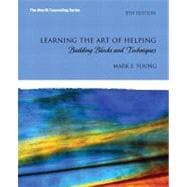
Note: Supplemental materials are not guaranteed with Rental or Used book purchases.
Purchase Benefits
What is included with this book?
Mark Young is a Professor at the University of Central Florida. He received his doctorate from Ohio University. He has trained helpers for more than 20 years and worked in community mental health, private practice, college counseling centers, and corrections for more than 15 years. Dr. Young’s professional writing has focused mainly on therapeutic methods and techniques, wellness, and counseling couples. He is the co-author of Counseling Today (2012) with Darcy Granello(Pearson) and Counseling and Therapy for Couples, 3/e with Lynn Long & Brigid Nooan (In press, Cengage) with Lynn Long & Brigid Noonan.
Chapter 1 Helping as a Personal Journey
The Demands of the Journey
Becoming a Reflective Practitioner
How a Helper Develops: Perry's Stages
The Development of Expertise
The Challenge of Development
The Perfect Helper or When Do I Quit Developing?
Who Can Be an Effective Helper?
What Can You Bring to a Client?
Chapter 2 The Nuts and Bolts of Helping
Defining Some Important Terms
How is Professional Helping Different from Friendship?
What Can You Expect from a Helping Relationship?
Learning Basic Skills and Common Curative Factors
Stages of the Helping Process: A Road Map
Chapter 3 The Therapeutic Relationship
The Importance of the Therapeutic Relationship in Creating Change
How Can a Helper Create a Therapeutic Relationship?
Other Factors That Help or Strain the Therapeutic Relationship
Chapter 4 Helping Someone Who Is Different
Differences That Can Affect the Therapeutic Alliance
Challenges Caused by Differences in Culture
Helping a Client Whose Culture is Different from the Helper's
Challenges Caused by Differences in Gender
Chapter 5 Invitational Skills
Listening to the Client's Story
Nonverbal Communication Between Helper and Client
Nonverbal Skills in the Helping Relationship
Opening Skills: How to Invite
Chapter 6 Reflecting Skills: Paraphrasing
Reflecting Content and Thoughts, Reflecting Feelings, and Reflecting Meaning
Reasons for Reflecting
The Skill of Paraphrasing: Reflecting Content and Thoughts
Common Problems in Paraphrasing
Chapter 7 Reflecting Skills: Reflecting Feelings
The Importance of Understanding Emotions
The Skill of Reflecting Feelings
How to Reflect Feelings
Common Problems in Reflecting Feelings
Chapter 8 Reflecting Skills: Reflecting Meaning and Summarizing
Meaning: Uncovering the Next Layer
How to Identify Meaning Issues with a Clint
Summarizing
The Nonjudgmental Listening Cycle
Chapter 9 Challenging Skills
When Should We Use the Challenging Skills?
Giving Feedback
How to Give Feedback
Confrontation
How to Confront
Evaluating Confrontation and Client Response
Chapter 10 Assessment and the Initial Interview
Why Assessment?
Testing as an Assessment Tool
Assessment is a Critical Part of Helping
Categorizing Clients and Their Problems
Beginning Assessment Methods
Chapter 11 Goal-Setting Skills
Where Do I Go from Here? Set Goals!
What are the Characteristics of Constructive Goals?
Who Owns the Problem? The Technique of Focusing on the Client
The Technique of Boiling Down the Problem
Chapter 12 Change Techniques
Giving Advice and Information
Brainstorming
The Skill of Alternate Interpretation
How to Teach a Client to Use Alternate Interpretation
Chapter 13 Outcome Evaluation and Termination Skills
Evaluating the Effectiveness of Helping
Basic Outcome Evaluation Methods
Termination
Dealing with Loss at Termination
How to Maintain Therapeutic Gains and Prevent Relapse Following Termination
Chapter 14 Curative Factors and Advanced Change Techniques: Part I
Curative Factors
Treatment Planning and the REPLAN System
The Therapeutic Factor of Enhancing Efficacy and Self-Esteem
Silencing the Internal Critic: The Technique of Countering
Practicing New Behaviors
Role-Playing
Homework
Chapter 15 Curative Factors and Advanced Change Techniques: Part II
Lowering and Raising Emotional Arousal
Techniques that Stimulate Emotional Arousal and Expression
Activating Client Expectations, Hope, and Motivation
Providing New Learning Experiences
Glossary
The New copy of this book will include any supplemental materials advertised. Please check the title of the book to determine if it should include any access cards, study guides, lab manuals, CDs, etc.
The Used, Rental and eBook copies of this book are not guaranteed to include any supplemental materials. Typically, only the book itself is included. This is true even if the title states it includes any access cards, study guides, lab manuals, CDs, etc.